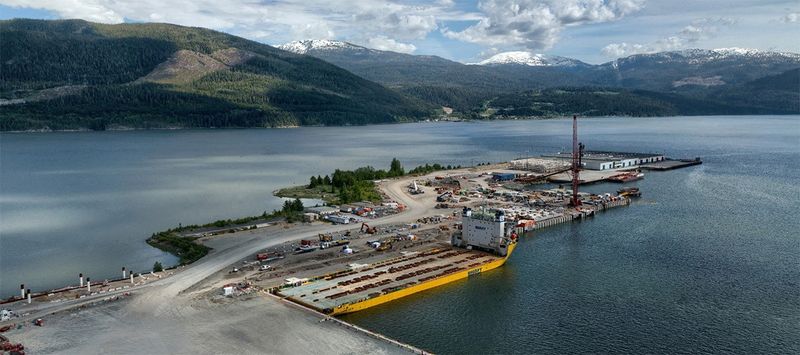US stands to lose Canadian natural gas when LNG Canada terminal starts up
2024.05.03 16:00

By Rod Nickel and Scott DiSavino
The start-up of LNG Canada, the country’s first such export terminal, is likely to strain its supplies for multiple years and force producers to reduce exports to the U.S., where demand for the fuel is record high, companies said.
Shell-led LNG Canada has begun testing its C$40-billion British Columbia terminal ahead of commercial operations starting in mid-2025. The terminal will process up to 2 billion cubic feet per day (bcfd), representing 11% of current Canadian gas output.
Like Canada, the U.S. is building more liquefied natural gas (LNG) terminals as it produces more gas than it consumes. However, even as the world’s top gas producer, the U.S. does not drill enough to meet both its domestic consumption plus rising export demand.
Western Canadian producers historically have been able to raise average production by up to 0.5 bcfd year-over-year, indicating a temporary supply gap for U.S. and eastern Canadian markets at the outset of LNG Canada’s full operations, Jamie Heard, vice president of capital markets at Tourmaline Oil, Canada’s biggest gas producer, told Reuters.
That estimate is based on new capacity, not year-to-year fluctuations due to outages.
“It’s going to take, in our view, up to four years to satisfy the pull that LNG Canada by itself is providing to the market,” Heard said.
Canada exported about 8 bcfd of gas by pipeline to the U.S. in 2023, compared with an average of 7.5 bcfd over the prior five years, according to the U.S. Energy Information Administration.
ARC Resources, Canada’s third-largest gas producer, expects periods of lower Canadian exports to the U.S. when supply and demand are mismatched, but those periods are likely to be short-lived as the market re-balances, CEO Terry Anderson said in an email.
Satisfying demand hinges on how prices compare among global gas hubs and differentials look to be more volatile, he said.
ARC will supply gas to the Cedar LNG project, one of several on British Columbia’s Pacific coast, which is close to Canada’s vast Montney shale field and has a short shipping distance to Asian markets.
Cedar is expected to receive final investment decision mid-year for construction of a plant using 0.4 bcfd of gas after opening in 2028 and Woodfibre LNG will use 0.29 bcfd after completion in 2027.
LNG Canada, in which Malaysia’s Petronas owns 25%, is considering a second 2-bcfd phase, while Ksi Lisims LNG is seeking government approval for what would be the country’s second-largest terminal, demanding a further 1.7-2 bcfd.
“The startup of LNG Canada opens new markets for Canadian gas other than the (U.S.) Lower 48 … any downturn in the amount of Canadian gas exports to the U.S. could reverberate across North America later this decade,” said Eli Rubin, senior energy analyst at consultancy EBW Analytics Group.
In the short-term, however, Rubin said LNG Canada will help clear the “tremendous current oversupply of gas in storage” in Canada and the U.S. [EIA/GAS]
After a mild winter, North American gas prices are currently low and supplies high. [NGA/]
Canada, the fifth-largest global gas producer, pulled a record 18.8 bcfd of gas out of the ground in December, according to the Canada Energy Regulator’s most current data.
In the longer term, over-exuberant drillers could produce too much gas, said Wood Mackenzie analyst Mark Oberstoetter, adding that the consultancy sees Canadian gas output reaching 25 bcfd in the mid-2030s.
Infrastructure, particularly facilities to process raw natural gas, needs to expand to enable more Canadian production.
Tourmaline’s Heard said his company and ARC are expanding processing capacity, but not all of the new plants needed by the industry are yet under construction.
Export pipeline capacity may also be a constraint on production growth as much of it is fully contracted for the next several years, ARC’s Anderson said.
Even so, problems of future higher demand are welcome for an industry currently struggling with surplus.
“Past this current season where things look over-supplied, we’re looking into a pretty exciting market,” said Jean-Paul Lachance, CEO of Peyto Exploration and Development.








